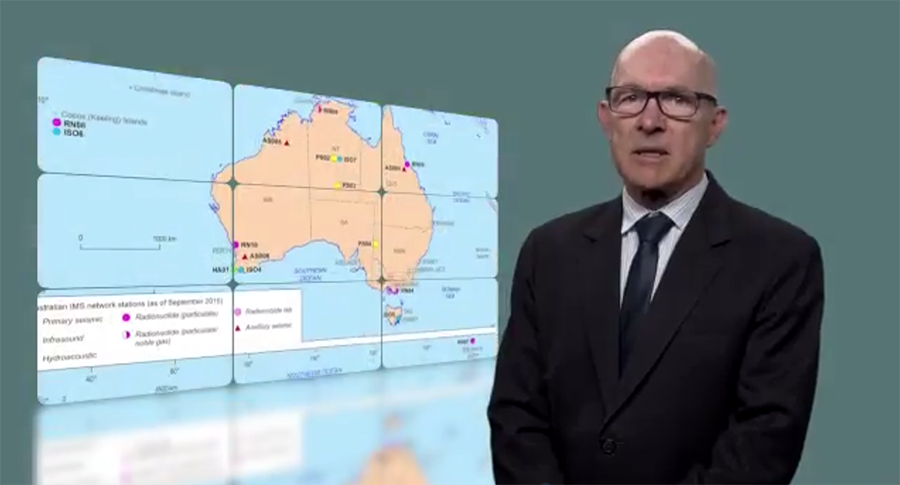"No one can solve this problem alone, but together we can change things for the better."
States Finally Settle on Next Leader for CTBTO
June 2021
By Daryl G. Kimball
After an unusually contentious process that lasted for months, representatives from the member states of the Preparatory Commission for the Comprehensive Nuclear Test Ban Treaty Organization (CTBTO) finally agreed to appoint Robert Floyd of Australia to serve as its executive secretary.
 Floyd, who is currently the director-general of the Australian Safeguards and Nonproliferation Office, said in an April 12 statement on Twitter in which he outlined his candidacy that he was “hopeful for new opportunities for the [Comprehensive Test Ban Treaty (CTBT)] in 2021, a year marking the 25th anniversary of the treaty’s opening for signature.”
Floyd, who is currently the director-general of the Australian Safeguards and Nonproliferation Office, said in an April 12 statement on Twitter in which he outlined his candidacy that he was “hopeful for new opportunities for the [Comprehensive Test Ban Treaty (CTBT)] in 2021, a year marking the 25th anniversary of the treaty’s opening for signature.”
“I am looking forward to opportunities such as the upcoming NPT Review Conference to stress the importance of the CTBT for international peace and security and to move us closer to the goal of entry into force,” he said.
He also stressed the importance of engaging all member states and putting the organization “on firm financial footing in difficult economic times.”
Floyd will become the fourth executive secretary of the organization, succeeding Lassina Zerbo, who was seeking a third term. Zerbo’s second four-year term will expire July 31.
The process for selecting the next executive secretary has been more controversial than in the past, in part because Zerbo was seeking an unprecedented third term. Although there are no rules against that, many states, including the United States, have stressed the general practice of heads of international organizations serving two terms. Some states argued that Zerbo would provide needed continuity through the difficulties created by the COVID-19 pandemic, but others disagreed. (See ACT, October 2020.)
Floyd’s appointment was secured when he won the support of 96 states, exactly two-thirds of the states voting, in a fifth round of balloting held on May 20. Through the earlier rounds of voting, which began May 17, Floyd won the support of more than 60 percent of the member states voting, while Zerbo was supported by less than 40 percent.
The organization, with an annual budget in excess of $100 million, is responsible for maintaining and operating the test ban treaty’s global verification regime, including the International Monitoring System (IMS) and International Data Centre (IDC). It is also responsible for developing and demonstrating on-site inspection capabilities in preparation for the treaty’s entry into force, as well as for promoting entry into force of the agreement.
To date, the CTBT has been signed by 185 states and ratified by 170 states, but the treaty has not entered into force due to inaction by eight holdouts, including the United States and China.
Following an inconclusive voting process in December 2020 involving Floyd and Zerbo that left the Australian just one vote short of securing two-thirds approval (see ACT, January/February 2021), the CTBTO chair for 2020, Faouzia Mebarki of Algeria, set a Feb. 5 deadline for new nominations.
On Jan. 8, Australia resubmitted Floyd’s nomination. Despite lagging far behind Floyd in the vote totals, Zerbo on Feb. 2 confirmed for a second time his “ability and commitment to continue working and contributing as executive secretary.” Through early 2021, the new CTBTO chair, Ivo Šrámek of the Czech Republic, engaged in intensive informal consultations aimed at reaching consensus on the selection process.
The CTBTO decided by consensus on March 26 that all member states that had taken part in the December 2020 voting, as well as new CTBT signatories and states that had paid their assessed financial dues, would be invited to cast votes. The member states also authorized Šrámek to facilitate a process leading to a first round of balloting no later than May 17.
Zerbo, a geophysicist originally from Burkina Faso, has made a significant impact on the CTBTO. He first joined the organization in 2004 to head the IDC and was chosen to be executive secretary in 2013. Since then, he has led work to complete the monitoring and verification system by bringing key monitoring stations in China online and strengthening the connections between the CTBTO and the global scientific community.
Zerbo also improved access to IMS-generated data on seismic events for member states, thus providing real time data for tsunami early warnings, as well as for nuclear detonations. Zerbo and his team provided detailed updates on North Korean nuclear test explosions. He also succeeded in keeping the CTBT in the international nonproliferation conversation despite the slow pace of the treaty’s entry into force.
